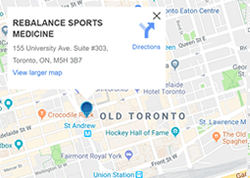Following the French when it comes to Postnatal Care
 Pregnancy and childbirth are known to significantly impact a woman’s body. The weakening and possible injury of the pelvic floor and perineum leave women at risk for urinary and faecal incontinence, pelvic organ prolapse, sexual dysfunction and chronic pain. Following a vaginal delivery about 50% of women loose some supportive function of the pelvic floor and up to 26% of women have major injury to the pelvic floor musculature.
Pregnancy and childbirth are known to significantly impact a woman’s body. The weakening and possible injury of the pelvic floor and perineum leave women at risk for urinary and faecal incontinence, pelvic organ prolapse, sexual dysfunction and chronic pain. Following a vaginal delivery about 50% of women loose some supportive function of the pelvic floor and up to 26% of women have major injury to the pelvic floor musculature.
Since 1985, French Social Security has been sponsoring the much discussed la ré-éducation périnéale apres accouchement, or perineal retraining after childbirth. This means the French government subsidizes up to 20 sessions of physiotherapy intended to tone the postnatal pelvic floor for all postpartum women. Claire Lundberg, a writer for Slate Magazine, comically detailed her experience in the French Healthcare system. She described the program’s intent was to help you to “be able to have sex with your husband again as soon as possible” but also to “make sure you can easily and safely have another child” (Lundberg, 2012). Considering France now has the second highest birth rate in the EU at 2.1, the French seem to be on to something.
There is evidence that intensive pelvic floor muscle therapy in continent pregnant women, prior to giving birth, led to fewer reports of urinary incontinence up to 6 months after delivery (Boyle et al, 2014). This was compared to women who received normal antenatal care. This means being proactive with your pelvic floor muscle therapy may help to reduce the risk of urinary incontinence!
Furthermore, postnatal pelvic floor physiotherapy for women who were experiencing persistent urinary incontinence also led to fewer reports of urinary incontinence twelve months after delivery (Boyle et al, 2014). The evidence shows that pelvic floor muscle training is most effective with supervised training involving strength training principles and close to maximal contractions for at least an 8 week period (Morkved and Bo, 2013). So it seems that the French have it right! Following up with a pelvic floor physiotherapist after delivery can help to strengthen and retrain the pelvic floor musculature and reduce the risk or treat urinary and fecal incontinence.
If you are experiencing any of the following symptoms postnatal pelvic physiotherapy may be appropriate for you:
- Urinary or fecal incontinence
- Hip, pelvis or low back pain during or post pregnancy
- Heaviness in the perineal area
References:
- Morkved and Bo (2014) Effect of pelvic floor muscle training during pregnancy and after childbirth on prevention and treatment of urinary incontinence: a systematic review. Br J Sports Med.48:299-310
- Boyle, Jean, Hay-Smith, Cody, Morkved (2014) Pelvic Floor Muscle Training for Prevention and Treatment of Urinary and Fecal Incontinence in Antenatal and Postnatal Women: A Short Version Cochrane Review. Neurology and Urodynamics. 33:269-276
- Claire Lundenberg (2012) The French Government Wants to Tone My Vagina. Slate Magazine
Rebalance Toronto
Rebalance Sports Medicine is a multidisciplinary clinic in downtown Toronto offering physiotherapy, chiropractic, registered massage therapy, sports medicine, naturopathy, Pilates and more.



 What to Expect From Your First Physiotherapy Visit
What to Expect From Your First Physiotherapy Visit The Benefits of Fascial Stretch Therapy [Demo]
The Benefits of Fascial Stretch Therapy [Demo] How Does Physiotherapy Work?
How Does Physiotherapy Work? Best Exercises for Low Back Pain
Best Exercises for Low Back Pain